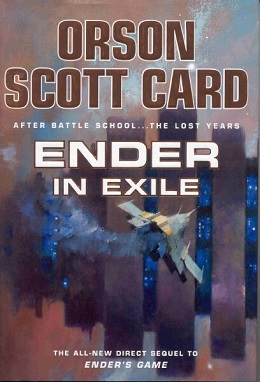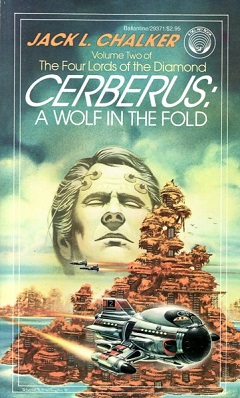Plot
Sitting at a desk with a surly co-worker, processing endless forms while fat cats in the office line their own nests, is no way to end a career as a space pilot. So when one ex-spacer finds that an order for a biological irradiator, needed to help wipe out an insect plague on a colony planet, has been sidelined to make way for a shipment of gin for one of his superiors, he takes action.
He invents a fictional new colony called "Nemo", and puts in a high priority order for the irradiator, meaning to re-route it to the real colony when it arrives. He forges several signatures, including his co-worker's and his own. He reasons that if anything at all gets done in the organization it's probably because people are forging signatures they'd have to wait forever to get. His deskmate just says "You can't beat the system."
The middle of the story tells the tale of how the new order progresses through the system, with officials inspecting the factory making the irradiator to see that it is indeed a real and properly patriotic business, and other officials creating official documents stating that the irradiator will indeed have the desired effect on the insects and so on and so forth.
In record time, that is to say mere years, the irradiator arrives, and immediately the bureaucrats smell a rat. The ex-pilot is called to explain to his boss, to the "I told you so's" of his deskmate. He seems oddly confident, however.
He explains to his boss that, yes, Nemo is not a colony. It's a code word for a "tentative priority", that is one which will apply if nothing else intervenes. When asked why he did this, he responds that certain shipments had been getting more priority than they deserve. Bit by bit he admits that the problem was the gin shipment, knowing that his boss is a mortal enemy of the gin drinker. That gets him off the hook, but then he plays his trump card.
He has an idea to stop abuses by creating a tracking process which will monitor a form as it proceeds through the system. His boss is only mildly interested until told of the extra subordinates he will have to hire to implement the process. Like most bureaucrats, his status, pay, perks, and pension increase with the number of people working for him. He decides to adopt the idea for the good of the organization, and gratefully offers the ex-pilot the job of supervisor in the new department.
Returning to his desk, our hero informs his surly deskmate that "You can beat any system. All you do is turn the handle the way it goes, only more so." The response is "Shut up. And don't talk until you can talk sense."

Food irradiation is the process of exposing food and food packaging to ionizing radiation. Ionizing radiation, such as from gamma rays, x-rays, or electron beams, is energy that can be transmitted without direct contact to the source of the energy (radiation) capable of freeing electrons from their atomic bonds (ionization) in the targeted food. The radiation can be emitted by a radioactive substance or generated electrically. This treatment is used to improve food safety by extending product shelf-life (preservation), reducing the risk of foodborne illness, delaying or eliminating sprouting or ripening, by sterilization of foods, and as a means of controlling insects and invasive pests. Food irradiation primarily extends the shelf-life of irradiated foods by effectively destroying organisms responsible for spoilage and foodborne illness and inhibiting sprouting.

The Tandy 1000 was the first in a line of IBM PC compatible home computer systems produced by the Tandy Corporation for sale in its Radio Shack and Radio Shack Computer Center chains of stores.

The League of Extraordinary Gentlemen is a comic book series co-created by writer Alan Moore and artist Kevin O'Neill which began in 1999. The series spans two six-issue limited series, Volume I, Volume II, and an original graphic novel Black Dossier from the America's Best Comics imprint of DC Comics, as well as a third volume and spin-off trilogy Nemo published by Top Shelf and Knockabout Comics. According to Moore, the concept behind the series was initially a "Justice League of Victorian England" but he quickly developed it as an opportunity to merge elements from many works of fiction into one world.

The High Crusade is a science fiction novel by American writer Poul Anderson, about the consequences of an extraterrestrial scoutship landing in Medieval England. Poul Anderson described the novel as "one of the most popular things I've ever done, going through many book editions in several languages."

The Mysterious Island is a novel by Jules Verne, published in 1874. The original edition, published by Hetzel, contains a number of illustrations by Jules Férat. The novel is a crossover sequel to Verne's famous Twenty Thousand Leagues Under the Sea and In Search of the Castaways, though its themes are vastly different from those books. An early draft of the novel, initially rejected by Verne's publisher and wholly reconceived before publication, was titled Shipwrecked Family: Marooned With Uncle Robinson, seen as indicating the influence of the novels Robinson Crusoe and The Swiss Family Robinson. Verne developed a similar theme in his later novel, Godfrey Morgan.
Radioresistance is the level of ionizing radiation that organisms are able to withstand.

The Macra Terror is the completely missing seventh serial of the fourth season in the British science fiction television series Doctor Who, which was first broadcast in four weekly parts from 11 March to 1 April 1967. It focuses on the Second Doctor, Ben, Polly and Jamie unravelling a mystery on a human colony planet in the future, and introduces the alien race known as the Macra. Although audio recordings, still photographs, and clips of the story exist, no episodes of this serial are known to have survived. In December 2018, the BBC released a teaser trailer for an animated version of the serial using existing audio, to be released March 2019.

Ender in Exile is a science fiction novel by American writer Orson Scott Card, part of the Ender's Game series, published on November 11, 2008. It takes place between the two award-winning novels: Ender's Game and Speaker for the Dead. It could also be considered a parallel novel to the first three sequels in the Shadow Saga, since the entirety of this trilogy takes place in the span of Ender in Exile. The novel concludes a dangling story line of the Shadow Saga, while it makes several references to events that take place during the Shadow Saga. From yet another perspective, the novel expands the last chapter of the original novel Ender's Game. On the one hand, it fills the gap right before the last chapter, and on the other hand, it fills the gap between the last chapter and the original (first) sequel. Ender in Exile begins one year after Ender has won the bugger war, and begins with the short story "Ender's Homecoming" from Card's webzine Intergalactic Medicine Show. Other short stories that were published elsewhere are included as chapters of the novel.

Every Man for Himself is a 1980 drama film directed, co-written and co-produced by Jean-Luc Godard that is set in and was filmed in Switzerland. It stars Jacques Dutronc, Isabelle Huppert, and Nathalie Baye, with a score by Gabriel Yared. Nathalie Baye won the César Award for Best Supporting Actress.
"To Market, to Market" is the second episode of M*A*S*H. It was first aired on September 24, 1972 and repeated on April 29, 1973. Like many other M*A*S*H episodes, this one parodies army bureaucracy.
Trusted timestamping is the process of securely keeping track of the creation and modification time of a document. Security here means that no one—not even the owner of the document—should be able to change it once it has been recorded provided that the timestamper's integrity is never compromised.

30,000 Leagues Under the Sea is a 2007 film directed by Gabriel Bologna. It is a modern update on the classic book 20,000 Leagues Under the Sea, and stars Lorenzo Lamas as Lt. Aronnaux and Sean Lawlor as the misanthropic Captain Nemo. It also stars Natalie Stone, Kerry Washington, and Kim Little.

Cerberus: A Wolf in the Fold is a science fiction novel by American writer Jack L. Chalker. First published as a paperback in 1982, it is the second book in the Four Lords of the Diamond series. It continues the saga started in Lilith: A Snake in the Grass, and is followed by Charon: A Dragon at the Gate and Medusa: A Tiger by the Tail'.

"Critical Film Studies" is the 19th episode of the second season of Community. It was originally aired on March 24, 2011 on NBC.
The International Facility for Food Irradiation Technology (IFFIT) was a research and training centre at the Institute of Atomic Research in Agriculture in Wageningen, Netherlands, sponsored by the Food and Agriculture Organization (FAO) of the United Nations, the International Atomic Energy Agency (IAEA) and the Dutch Ministry of Agriculture and Fisheries.

The Nut Job 2: Nutty by Nature is a 2017 3D computer-animated comedy film directed by Escape from Planet Earth director Cal Brunker and written by Brunker, Bob Barlen and Scott Bindley. A sequel to The Nut Job (2014), it stars the voices of Will Arnett, Maya Rudolph, Jackie Chan, Katherine Heigl, Bobby Moynihan, Bobby Cannavale, Isabela Moner, Jeff Dunham, and Gabriel Iglesias. Produced by Gulfstream Pictures, Redrover International and ToonBox Entertainment, the film was released theatrically on August 11, 2017, by Open Road Films.

Ghost of Relativity is a 2015 Hong Kong romantic-comedy with a supernatural theme television drama created and produced by TVB, starring Moses Chan, Kristal Tin and Nancy Wu as the main cast. The Chinese title has a double meaning, when read accordingly it literally translates to "Ghost to Overtime With You", however the word "ghost" (鬼) is also a Hong Kong slang that is equivalent to "who the hell" in English, so the Chinese title could also translate as "Who The Hell Wants to Overtime With You". Filming took place from October 2014 till February 2015. The drama is broadcast on Hong Kong's Jade and HD Jade channels from July 13 till August 9, 2015 every Monday through Sunday during its 9:30-10:30 pm timeslot with a total of 28 episodes.
BitGo is a Blockchain security company. It is headquartered in Palo Alto, California, and was founded in 2013 by Mike Belshe and Ben Davenport.

"Dark Waters" is the sixth episode of the sixth season of the American fantasy drama series Once Upon a Time, which aired on October 30, 2016.















